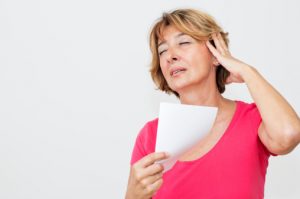
Experts from the North American Menopause Society (NAMS) came together to weigh in on effective and ineffective hormone-free treatments for hot flashes.
Up to 80 percent of menopausal women try to treat their hot flashes without the use of hormones, but many treatments show to be ineffective. U.S. surveys have revealed many women are confused about how to manage menopause symptoms, and nearly 75 percent do not feel informed enough about herbal options which are available. By examining available studies, healthcare providers can now confidently advise women on how to handle menopause symptoms.
Researchers from NAMS uncovered effective methods to treat hot flashes, including behavioral and non-hormonal medications. Randomized, double-blind, controlled trials are the gold standard when it comes to determining effectiveness of treatment methods. Trials of this caliber revealed that combining relaxation, sleep, hygiene and learning to take a healthy, positive approach to menopause are effective cognitive-behavioral therapies for hot flashes. Hypnosis and mind-body approaches were also found to be effective ways to minimize hot flashes, so researchers recommend these as well.
Treatment options like weight loss, avoiding soy and reducing stress did not provide strong evidence to support their reduction of hot flashes, so researchers recommend these methods be approached with caution.
Some prescription non-hormonal medications were also shown to be effective – just not as much as hormones. Researchers do recommend that medications should be given in low dosages first, to see if the patient tolerates it, before prescribing more over time.
A strong amount of evidence revealed exercise, yoga, paced respiration and acupuncture do not work to improve hot flashes, although they can provide other benefits. Furthermore, many herbal remedies, chiropractic techniques and brain-training techniques are not effective either and should not be recommended. Lastly, healthcare providers should not recommend “staying cool” or avoiding triggers – their effectiveness does not show strong evidence and could just delay effective treatment.
The findings were reported in Menopause.